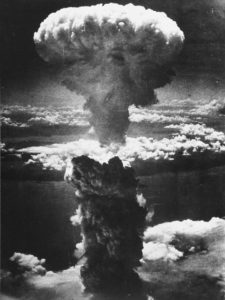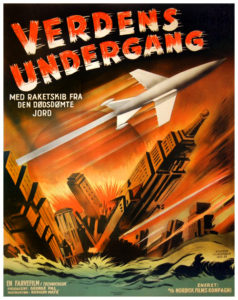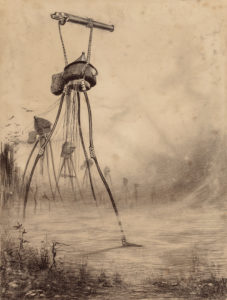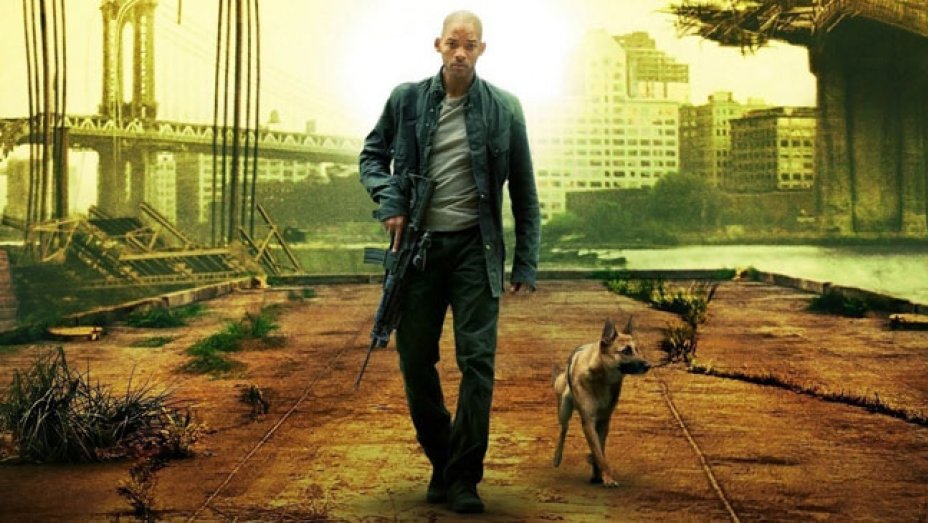The cinema of the end of the world
 It is possible that some readers, when seeing the title of this article, imagine some connection with the book “The restaurant at the end of the universe” by Douglas Adams, from the saga “The Hitchhiker’s Guide to the Galaxy”. Perhaps yes, we will see it later. But, the idea is to discuss movies that have the end of the world as their theme. After all, in a pandemic era, could there be a more present theme?
It is possible that some readers, when seeing the title of this article, imagine some connection with the book “The restaurant at the end of the universe” by Douglas Adams, from the saga “The Hitchhiker’s Guide to the Galaxy”. Perhaps yes, we will see it later. But, the idea is to discuss movies that have the end of the world as their theme. After all, in a pandemic era, could there be a more present theme?
The idea of the end of the world is not new, especially in Western culture. After all, the book of Revelation already brought this idea two thousand years ago. More than that, the end of the world has always served as a form of intimidation to keep the faithful away from the sin.
 The popularization of literature, mainly from the 19th century onwards, brought to the public the first works on the theme . A highlight is the book “The last man” (1826) by the notable writer Mary Shelley, Frankenstein’s creator.
The popularization of literature, mainly from the 19th century onwards, brought to the public the first works on the theme . A highlight is the book “The last man” (1826) by the notable writer Mary Shelley, Frankenstein’s creator.
Other authors have ventured into the topic, usually science fiction writers, such as Sherlock Holmes creator, Sir Arthur Conan-Doyle, with “The Poison Belt” in 1928 or H.G. Wells’s “War of the Worlds” in 1898. Since then, many others have followed, especially after the explosion of the first atomic bomb, where the idea of nuclear devastation and the arrival of the Cold War made this idea more real.
 The advent of cinema made the theme even more popular, translated into images and sounds that stirred the viewers’ imagination. In the first decades of the 20th century, the Danish film “Verdens Undergang”, from 1916, the French “La fin du monde”, from 1931, and the American “When Worlds Collide”, from 1951, all explored the end of the world.
The advent of cinema made the theme even more popular, translated into images and sounds that stirred the viewers’ imagination. In the first decades of the 20th century, the Danish film “Verdens Undergang”, from 1916, the French “La fin du monde”, from 1931, and the American “When Worlds Collide”, from 1951, all explored the end of the world.
And what is the reason for this fascination with the end of the world? Any human being has any time experienced the sensation of fantasy in relation to something. It can be a loved person, some object of desire, or simply the thought “what if? …”. How many times do you get to a high place and take a look down just to feel the chill in your belly?
 This mixture of morbidity and enchantment has already inspired many movies, in addition to those mentioned above. To get an idea, only on the IMDB website can be found 942 references to titles that have the theme of the end of the world or apocalypse.
This mixture of morbidity and enchantment has already inspired many movies, in addition to those mentioned above. To get an idea, only on the IMDB website can be found 942 references to titles that have the theme of the end of the world or apocalypse.
This leads to another interesting point of view, which brings me memories of the time of the Journalism course. These are the different approaches on the topic, grouped roughly as dystopian or post-apocalyptic.
Dystopia is the opposite of utopia, the perfect society where everyone is happy. It would be that end of the world situation, where people struggle to survive. A utopia is not for film, except when it is to show that something rotten is going to be revealed. An example would be “Logan’s Run” (USA, 1976), a perfect society where everyone is young, but that reveals the execution of people over 30 years old. Other recent examples would be “Divergent” (USA, 2014), “The Hunger Games” (USA, 2012), and “The Ultimate Warrior” (USA, 1975).
 Post-apocalyptic films are those that , as the name says, show the situation of a society after an apocalyptic event. Some classic examples would be “The Omega Man” (USA, 1971), “Planet of the Apes” (USA, 1968), and “Mad Max” (AUS, 1979).
Post-apocalyptic films are those that , as the name says, show the situation of a society after an apocalyptic event. Some classic examples would be “The Omega Man” (USA, 1971), “Planet of the Apes” (USA, 1968), and “Mad Max” (AUS, 1979).
Obviously, the list is huge, especially if we count a large number of smaller productions launched in the 1980s, bringing together a deserted location, half a dozen unknown actors and a half-hearted story. And if we join the countless Japanese animes on the topic, the roll becomes endless.
 The most curious thing is that there is no clear border between these themes, and that perfect post-apocalyptic society can become a dystopia when the skeletons come out of the closet. After all, you need to have some emotion in the story, don’t you?
The most curious thing is that there is no clear border between these themes, and that perfect post-apocalyptic society can become a dystopia when the skeletons come out of the closet. After all, you need to have some emotion in the story, don’t you?
And speaking about emotion, what can we say about our current situation? Humanity had already gone through epidemics, pests, wars and other problems, but never a situation that affected everyone at the same time. Perhaps that is why the inertia and denial reaction of so many government officials, organizations and even ordinary people.
 Although Life seems to be imitating Art – when it should be the other way around – what we see is a bad imitation. In almost all films and books we see humans getting away from post-apocalyptic situations thanks to unity and solidarity. But what seems to be reigning is the greed of corporations and the selfishness of men.
Although Life seems to be imitating Art – when it should be the other way around – what we see is a bad imitation. In almost all films and books we see humans getting away from post-apocalyptic situations thanks to unity and solidarity. But what seems to be reigning is the greed of corporations and the selfishness of men.
I am curious to see the first production based on the current crisis. Will it tell the story of selfless scientists researching the vaccine, or will it follow in the wake of the fake News, about the creation of the virus in the laboratory, the refusal of the miraculous chloroquine, or, most importantly, that all of this was no more than that a frame to harm the beloved president of a banana republic? Those who live will see.






